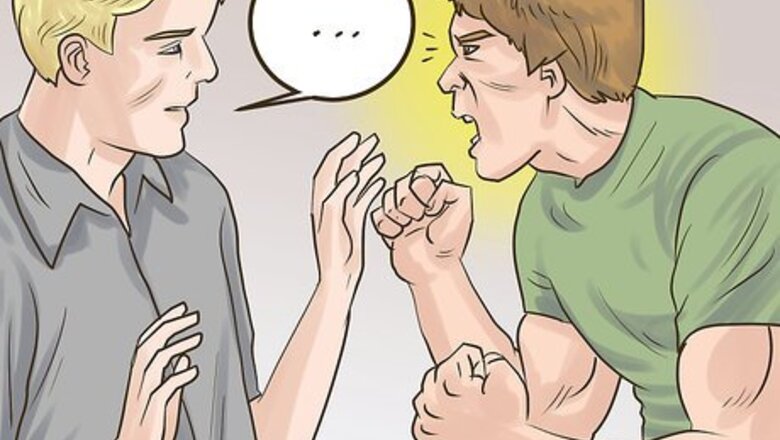
views
Talking To Your Aggressor

De-escalate the situation. De-escalation means reducing tensions between you and the person who is fighting you or wishing to fight you. To de-escalate the situation, don’t antagonize the hostile person. Express your disinterest in fighting. For instance, you might say, “I am not interested in fighting. Let’s go about our business.” If someone pushes you, do not push back. If they stare you down, do not stare back. If they call you a derogatory name, do not call them a name back. EXPERT TIP Tsahi Shemesh Tsahi Shemesh Self Defense Trainer Tsahi Shemesh is a self-defense expert, specializing in Krav Maga. He began learnring Krav Maga in 1988, and trained directly under Imi Lichtenfeld, the founder of the sport. Shemesh is the Founder and Program Director of Krav Maga Experts in New York City. He has certified hundreds of instructors, trained a wide variety of professionals (including EMTs and NYPD officers), and his curriculum is taught in over a dozen countries worldwide. Tsahi Shemesh Tsahi Shemesh Self Defense Trainer Your defense mechanism starts with what you see and hear. When you're aware of your surroundings, you can notice when someone is acting up, or seem a little funny. Your first step is to disengage from the situation. You don't have to defend your honor or prove a point.

Apologize to the hostile party. Even when you haven’t done anything wrong, apologizing to the person who wants to fight you can help you exit the fight without injury. Just say, “I’m very sorry for offending you.” If the hostile party cites a particular cause of offense, apologize in reference to the perceived offense. For example, if the hostile party says, “My friend doesn’t like you. I don’t like you either!”, you might say, “I am very sorry.” If you’re in a bar, you might close your apology by offering to buy the aggressor a drink.

Introduce yourself. If, after apologizing to the hostile party, they continue to act belligerent, you could catch them off guard by showing them you’re a friendly sort. Say, “Hello, my name is ____. What’s your name?” This will show them you are respectful and want no part of a fight.

Inspire sympathy from the hostile person. If introducing yourself and apologizing don’t work out, you could try to elicit a sympathetic response from the hostile party. You might, for instance, excuse your behavior (even if you’ve done nothing wrong) by saying, “I’ve just had a rough night, I broke up with my partner,” “Sorry, mate, my mom just passed away,” or “My mind isn’t right, I was just diagnosed with cancer.” Under normal circumstances, you should not lie. But in order to gain sympathy from the hostile party and exit a fight without injury, you might choose to resort to some mild deception.

Confuse the other person. Instead of calling the hostile party names or cussing them out, you could disarm them by saying something zany and unexpected. Your non-sequitur will catch them unawares, thereby deflating tension and allowing you to exit the fight without being harmed. For instance, you might say: The cows sometimes have black and white spots. My house is blue and red. This house is blue and green. Yesterday it was rainy, but tomorrow it will be sunny.
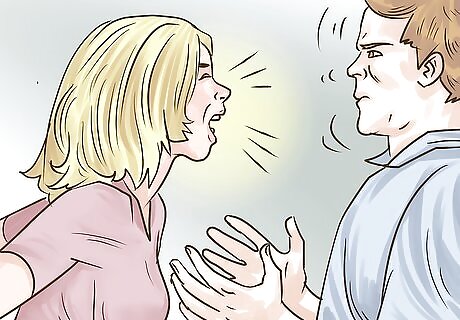
Intimidate the aggressor. If being a nice person hasn’t helped you de-escalate the situation, take the opposite tack and try to look strong and unafraid. Throw your shoulders back and look them straight in the eye, shouting "Get away!" or “Back off!” as loudly as possible. This will let the aggressor know you are willing to fight if necessary, and hopefully make them think twice about taking you on.
Taking Action
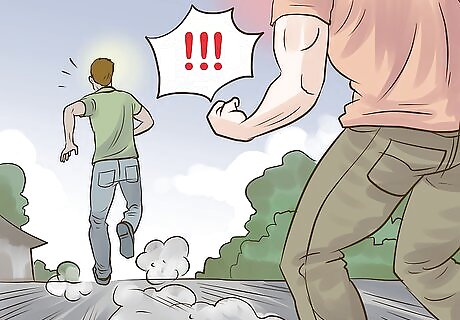
Run away from the fight. While the number of people you're up against will affect your ability to escape from a fight without injury, your first instinct should be to escape whenever possible. If necessary, shove, disable, or distract your attacker in some way and run for it. Potential distracting or disabling maneuvers you might need to utilize include punching your opponent in the nose, shoving them away, or delivering a swift kick to the groin (if facing a male aggressor).

Perform “the fence.” If you’re not able to immediately escape the fight, or if you doubt your ability to strike your aggressor with enough force to distract or destabilize them, you should take action to keep them at bay. The fence is a maneuver that both demonstrates a disinterest in fighting and prepares you to defend yourself if necessary. Show the hostile party your hands with the palms facing outward and fingers pointed up. At the same time, take a deep breath and breathe out slowly to help you relax. You could also reiterate your unwillingness to fight by saying, “I do not wish to fight. Let’s go about our business.”
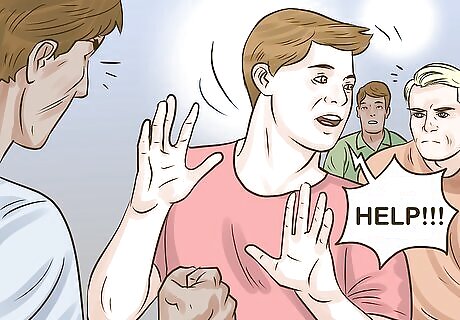
Call for help. If you’re in an area with security or police, get their attention so they can diffuse the situation. At the very least, attract the attention of passers-by so they can intervene on your behalf. Sometimes an aggressor can be dissuaded from pursuing the fight simply by having another set of eyes on them. When getting help from others, usually a simple "Help me!" will suffice. You might also try, “Over here!” or “Police!”
Defending Yourself
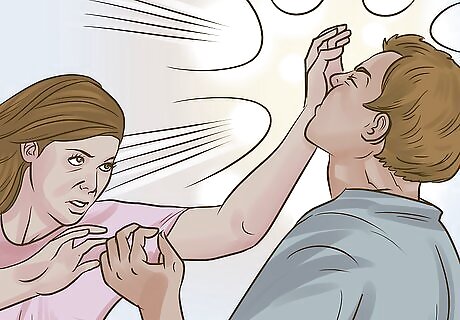
Strike the aggressor’s nose. Aim the heel of your palm at the aggressor’s nose and push upward. Move your entire body into the movement. The attack should knock them off balance temporarily. When punching, aim the knuckle of your middle finger at your aggressor’s nose (or whatever you’re targeting). Additionally, keep the top of your hand aligned with your wrist when throwing a punch. This will prevent injury to your hand and wrist. EXPERT TIP Ross Cascio Ross Cascio Self Defense Trainer Ross Cascio is a Krav Maga Worldwide self-defense, fitness, and fight instructor. He has been training and teaching Krav Maga self-defense, fitness, and fight classes at the Krav Maga Worldwide HQ Training Centers in Los Angeles, CA for over 15 years. He helps people become stronger, safer, and healthier through Krav Maga Worldwide training. Ross Cascio Ross Cascio Self Defense Trainer If you're attacked, it's essential to know how to defend yourself. You must know how to punch, kick, use your knees, and use your elbows. You need to do enough damage to the attacker so that you can escape. Punch them in the face, kick them in the groin, and get out of there.
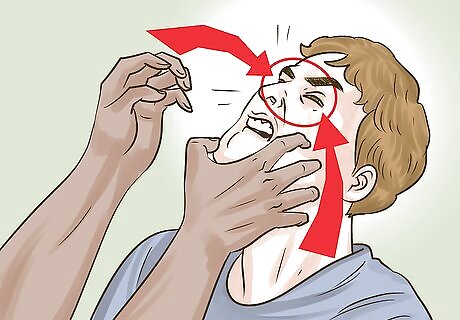
Blind your opponent. Your opponent will be unable to fight you when they cannot see. Try to poke or scratch the aggressor’s eyes with your fingers or fist. If you have any sand, dirt, or other debris around, you could grab a handful and throw it in your opponent’s face.
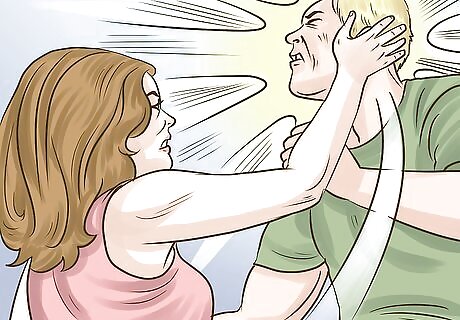
Box the aggressor’s ears. If your opponent has grabbed your arm or neck, curl your hand slightly, then smack one of their ears with the flat part of your palm. Your aggressor’s head will jerk to the side. Use your other hand to strike them immediately in their eyes or nose.
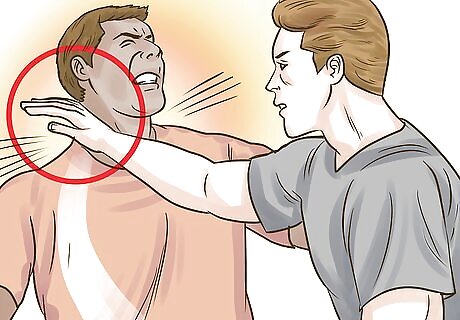
Strike the neck or throat. Use the blade of your hand – the area between your pinkie finger and wrist – to strike your attacker’s neck, stunning them. Hold your hand as straight and firm as possible. Pull your hand back as if you’re scratching your ear, then rotate it forward, extending at the elbow, and finally snapping your wrist into their neck. Alternately, push your whole outer forearm into your aggressor’s throat. This will knock them back and cause them to lose their balance.
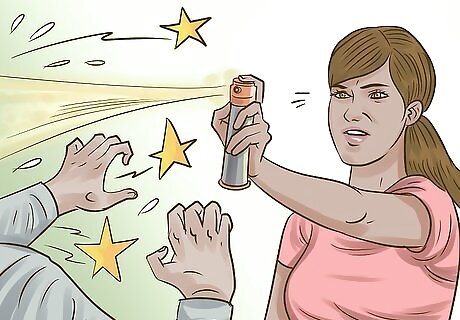
Use pepper spray. Pepper spray is a handheld canister filled with a noxious gas that irritates the eyes and lungs. If you have pepper spray on hand, you can spray it at the aggressor, then escape the fight before they recover.

Block incoming punches. The exact technique needed to block an incoming punch varies slightly depending on the sort of punch your aggressor has decided to use. Generally, however, blocks fall into three different categories. To perform a "guard" block, cover your face and neck by bringing your forearms up in front of your face while tucking your chin. This block is good for blocking against wide punches. To perform a "catch," swat your the aggressor's hand away from your body or face just before they make contact. Your reflexes will need to be fast in order to perform a catch. Finally, you could perform an interception. This involves raising your arm in an "L" shape on the side of your body the attacker is targeting. For instance, if your attacker strikes with their right fist, raise your left arm in an "L" to deflect the blow.
Striking With Your Feet and Legs
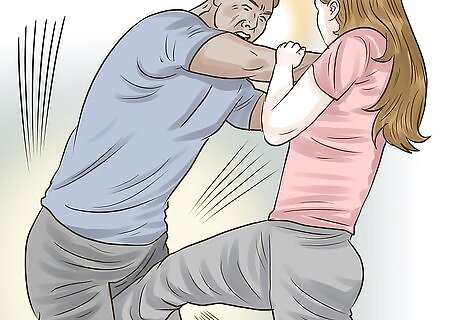
Use a groin strike to escape. If you’re grappling with your attacker and unable to use your hands to land a strike, slam your foot or knee upward into your opponent’s groin. The pain of the impact will cause them to release you, allowing you to make your escape.
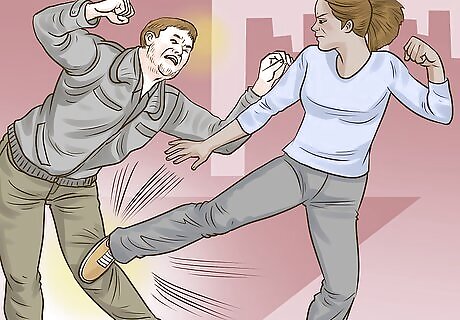
Cripple your opponent’s knee. Send a swift kick with the bottom of your foot into your opponent’s knee. You can aim at the front, side, or back of their knee. Don't stop when you simply make contact. Instead, push your whole weight through the attacker's knee. The impact will throw them off balance and allow you to escape.
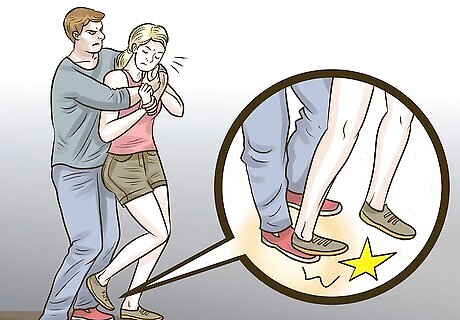
Stomp your aggressor’s foot when grabbed from behind. If the person you’re fighting has their arms around you from behind, bring up one foot as high as it will go. Slam the foot down on the top of your attacker’s toes. In their pain, they will loosen their grip, allowing you to escape.

















Comments
0 comment